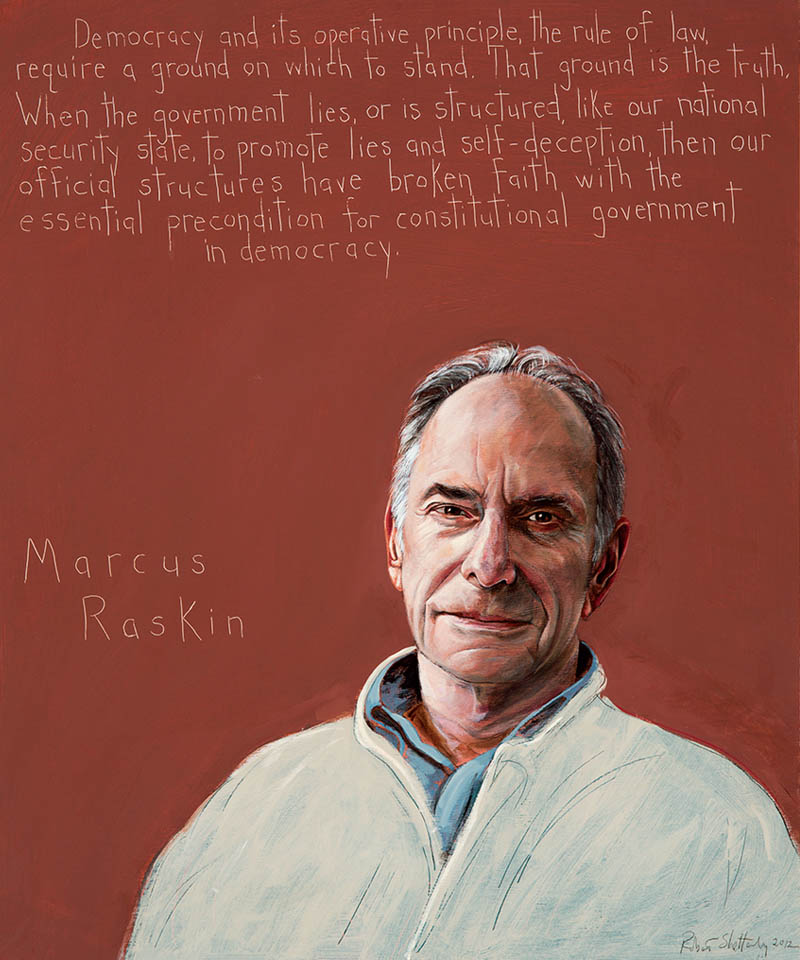
Marcus Raskin
Political Philosopher, Peace and Social Justice Activist : b. 1934
“Democracy and its operative principle, the rule of law, require a ground on which to stand. That ground is the truth. When the government lies, or is structured like our national security state to promote lies and self-deception, then our official structures have broken faith with the essential precondition for constitutional government in democracy.”
Biography
Marcus Raskin, a professor, political activist, scholar and a public intellectual, has been called “the dean of the American Left” by Dennis Kucinich. He is the co-founder (with Richard Barnet) of the politically progressive Institute of Policy Studies (IPS), and he teaches social movements, national security and the philosophy of public policy at the Stephen J. Trachtenberg School of Public Policy and Public Administration at the George Washington University in Washington, DC.
Raskin was born on April 30, 1934 in Milwaukee, Wisconsin to Ben and Anna Goodman Raskin. At the age of 16, Raskin, a piano prodigy, went to study at the Julliard School in New York City. He then left Julliard to study politics and law at the University of Chicago, where Raskin obtained a BA in 1954 and a JD in 1957.
In 1958, Raskin moved to Washington, DC to serve as legislative counsel to liberal Democratic members of Congress, including Robert Kastenmeier (D-WI) and James Roosevelt (D-CA). After just three years, he was tapped to serve as an assistant on national security affairs for McGeorge Bundy, the National Security Advisor to President John F. Kennedy.
It was during his tenure with Bundy that Raskin experienced a strong political awakening regarding American foreign and military policy. His growing disagreements with the U.S. military escalation in Vietnam lead him to resign from National Security Council. He was reassigned to the Bureau of the Budget (now the Office of Management and Budget). But in 1963, Raskin left government altogether and established the IPS with Richard Barnet, a former attorney with the State Department. The progressive think-tank refused government funding and made all its scholarship available to the public, becoming a vehicle for Raskin and his colleagues to offer critiques of the federal government’s policies.
In 1965, Raskin and Bernard Fall published the Vietnam Reader (which became particularly popular in the anti-war movement), and Raskin authored “A Citizen’s White Paper on America Policy in Vietnam and Southeast Asia.” At the height of the resistance to the Vietnam War, Raskin was indicted for conspiracy to aid people resisting the draft. He and his “co-conspirators”, William Sloane Coffin, Dr. Benjamin Spock, Michael Ferber and Mitchell Goodman, were known as the “Boston 5.” They were acquitted of the charge.
In 1971, Raskin authored and co-authored three works that solidified Raskin’s place as the primary thought leader on a philosophical approach to conflict resolution that aims to achieve peaceful coexistence through reconciliation following violent conflict and the development of a national identity based on reciprocal respect. The books, Washington Plans An Aggressive War (with Richard Stavins and Richard Barnet); An American Manifesto: What’s Wrong with America and What We Can Do About It (with Richard Barnet); and Being and Doing: An Inquiry Into the Colonization, Decolonization and Reconstruction of American Society and Its State, described a philosophy that became known as “social reconstruction.” Raskin wrote, “within human civilization there is an internal spirit that emanates from caring and an egalitarian interdependence that is denied at humanity’s peril.” It was also during this time, when Raskin coined the term “national security state”: “It is hardly surprising that the national security apparatus built as it is upon principles of unaccountability, secrecy, ultra-allegiance to the state, and willingness to lie to courts and legislatures, is unconcerned with human and natural rights.”
During the 1980s, Raskin served as co-chair of the anti-nuclear organization SANE/FREEZE. And he helped to craft a progressive political agenda with a coalition of labor unions and public interest groups called the Progressive Alliance. Raskin continued presenting his vision for a progressive, socially conscious and economically inclusive America with books like The Common Good: Its Politics, Policies, and Philosophy and Winning America: Ideas and Leadership for the 1990s (1986, co-authored with Chester Hartman).
As the nation entered into the new millennium, Raskin wrote a series of books that extolled liberalism in America, and devised policy prescriptions that would bolster the theory of “social reconstruction.” Those books include, Liberalism: The Genius of American Ideals (2003); In Democracy’s Shadow: The Secret World of National Security (2005, co-authored with Carl LeVan); and The Four Freedoms Under Siege: The Clear and Present Danger from Our National Security State (2006, co-authored with Robert Spero). Raskin even found the time to record his composition “Elegy for the End of the Cold War,” a piano retrospective of the Cold War era that was released in 2004.
In 1991, writer Seymour Hersh stated that “Marc Raskin remains an original voice for sanity and true democracy in running the nation’s security affairs.”
In the post 9/11 world, Raskin’s thoughts regarding the excesses of the national security state have proved prescient:
“We shall see that the national security state and the rule of law are mortal enemies. In the first place, by its nature and that mission that it has set for itself, the national security state’s apparatus needs arbitrary power. Such power has its own code, which is meant to govern or justify the behavior of the initiated — after the fact. It operates to protect the state apparatus from the citizenry.”
Programs
Americans Who Tell the Truth (AWTT) offers a variety of ways to engage with its portraits and portrait subjects. Host an exhibit, use our free lesson plans and educational programs, or engage with a member of the AWTT team or portrait subjects.

Education
AWTT has educational materials and lesson plans that ask students to grapple with truth, justice, and freedom.

Exhibits & Community Engagement
AWTT encourages community engagement programs and exhibits accompanied by public events that stimulate dialogue around citizenship, education, and activism.